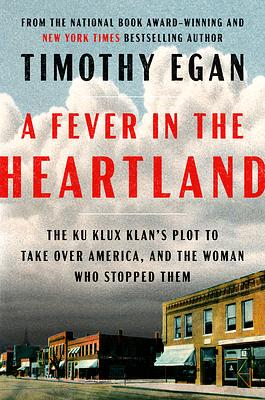Category: Books
You are viewing all posts from this category, beginning with the most recent.
📚 A Fever in the Heartland
Highly Recommended
Tells the story of how a grifter and serial abuser manipulated people to gain money and power. Loneliness was turned to belonging. Fear was turned to hate.
Also tells the story of courageous people that helped stop the villainy!
Almost every page has a parallel to current USA politics. A must read in these times.

📚 Read: The Hope of Glory by Jon Meacham
Not a coherent work, perhaps due to being a collection, rather than a planned book.
I was struck by no attempt at explaining how he can hold to both Universalism and High-Sacrament Orthodoxy at the same time.
📚 Highly anticipated (by me): Against the Machine by Paul Kingsnorth
📚 after months of renovation, my neighborhood library is back open. Celebrating by working there today.
📚 ebooks.com (unlike Amazon and Bookshop) show you clearly which are available in DRM-free format. See here.
Are there other sites (that are not super-niche) that do this for ebooks?
📚 In the USA, Amazon is removing the only (mostly) reliable way of backing up your books (“Download & Transfer via USB”) by Feb 26. One more reason to go elsewhere, and to buy DRM-Free.
Author: creates thousands of interesting names for things.
Reader: “what’s the important new concept we uncover in this book, and what fantastic name did you give it?”
Author: “I’m calling it ‘The Spiritual Realm’ and you’ll hear it A LOT.”
📚 #DeathOfTheEditor
📚 2024 Books Review
other 2024 reviews here
I am tracking all my completed books on my reading page and everything on Storygraph. (why Storygraph?) I would like to use micro.blog’s bookshelves, but it’s too buggy and incomplete at this stage.
This was a slow year, so I only completed 42 books. Here’s the summary from Storygraph.
Highly Recommended Books:
Non-Fiction:
- Amusing Ourselves to Death by Neil Postman. Still a relevant diagnosis for many of our current ills. (book) (post)
- The Ultimate Hidden Truth of the World… by David Graeber (posthumously). What if things don’t have to be the way they are? (book) (post)
- The Coddling of the American Mind by Greg Lukianoff and Jonathan Haidt. We are reaping the results from sowing distorted thinking. (book) (post)
Fiction:
- The Martian Chronicles by Ray Bradbury (book) (post)
- The Curse of Chalion (World of Five Gods #1) by Lois McMaster Bujold (book) (post)
- The Future by Naomi Alderman (book) (post)
Recommended Books
(Reverse-chronological order)
- Polostan (Bomblight #1) by Neal Stephenson (book)
- Sipsworth by Simon Van Booy (book)
- Midnight Riot (Rivers of London #1) by Ben Aaronovitch (book) (post)
- Mort (Discworld #4) by Terry Pratchett (book)
- The Shape of Joy by Richard Beck (book) (post)
- Convergence Problems by Wole Talabi (book)
- Dopamine Nation by Anna Lemke (book) (post)
- Death of a Cad (Hamish Macbeth #2) by M. C. Beaton (book)
- The Nature of the Beast (Gamache #11) by Louise Penny (book)
- Slow Productivity by Cal Newport (book) (post)
- Supercommunicators by Charles Duhigg (book) (post)
- The Rise and Reign of Mammals by Steve Brusatte (book)
- The Master and His Emissary by Iain McGilchrist (book) (post)
- Equal Rites (Discworld #3) by Terry Pratchett (book)
- Radical Respect by Kim Scott (book) (post)
- The Red House Mystery by A. A. Milne (book) (post)
- The Metamorphosis by Franz Kafka (book)
- Assassin’s Quest (Farseer Trilogy #3) by Robin Hobb (book)
- The PARA Method by Tiago Forte (book) (post)
](https://cdn.uploads.micro.blog/2363/2025/img-7811.jpg)
📚
- Bookshop.org has ebooks: yay!
- They support your chosen store: yay!
- But you have to use their app: boo!
- Except for DRM-free books: yay!
- But you can’t tell which are drm-free: boo!
- They have Standard Ebooks all available (for free): yay!